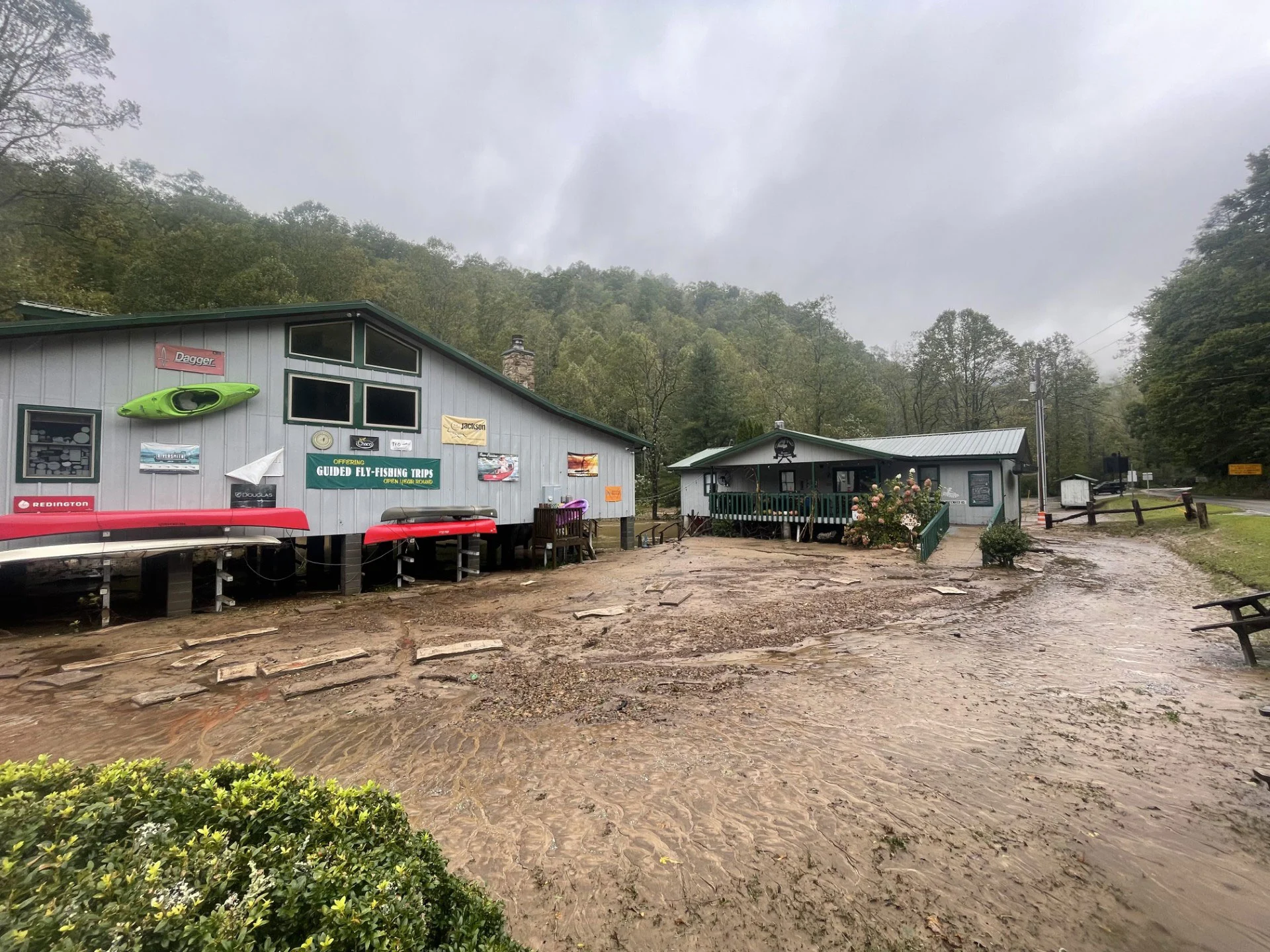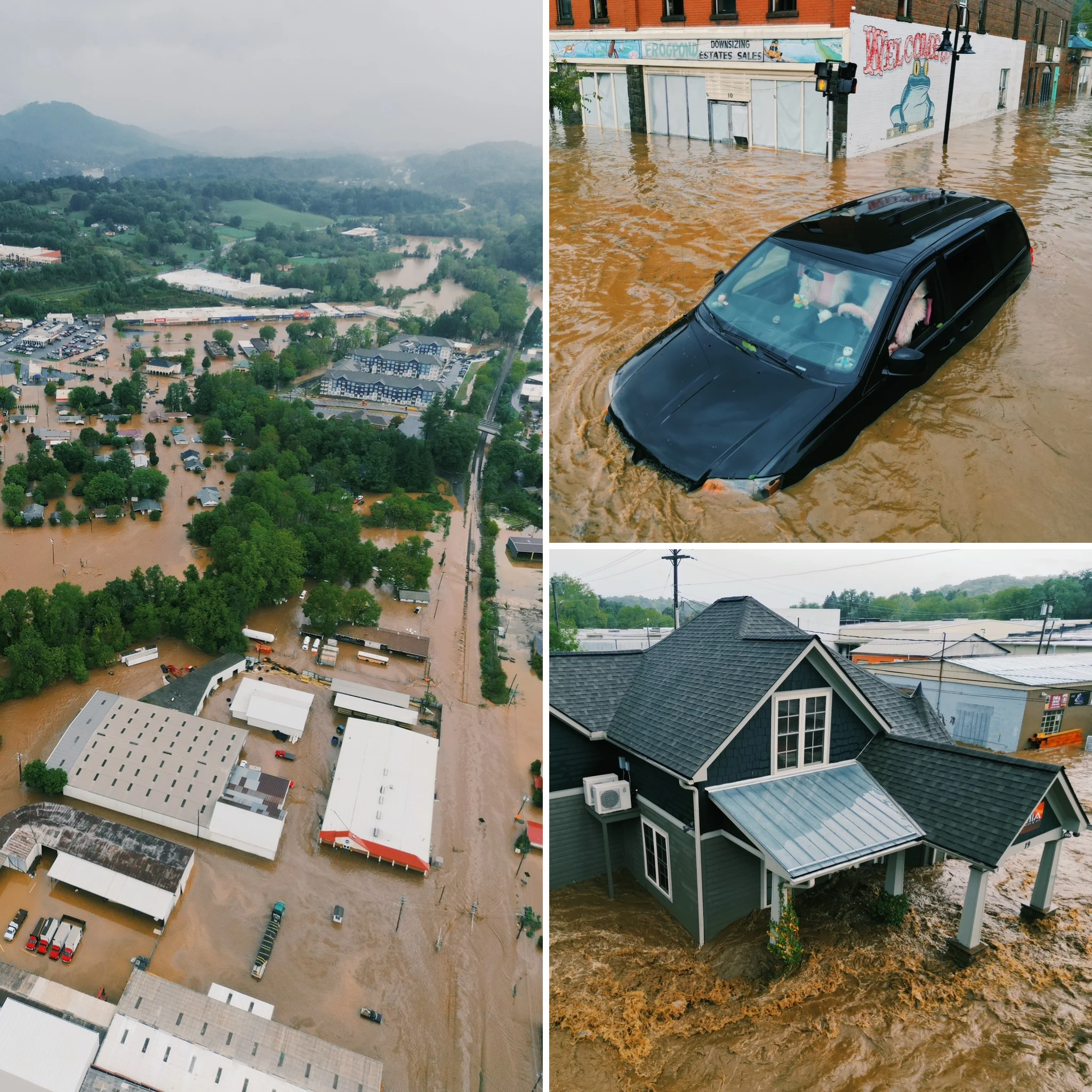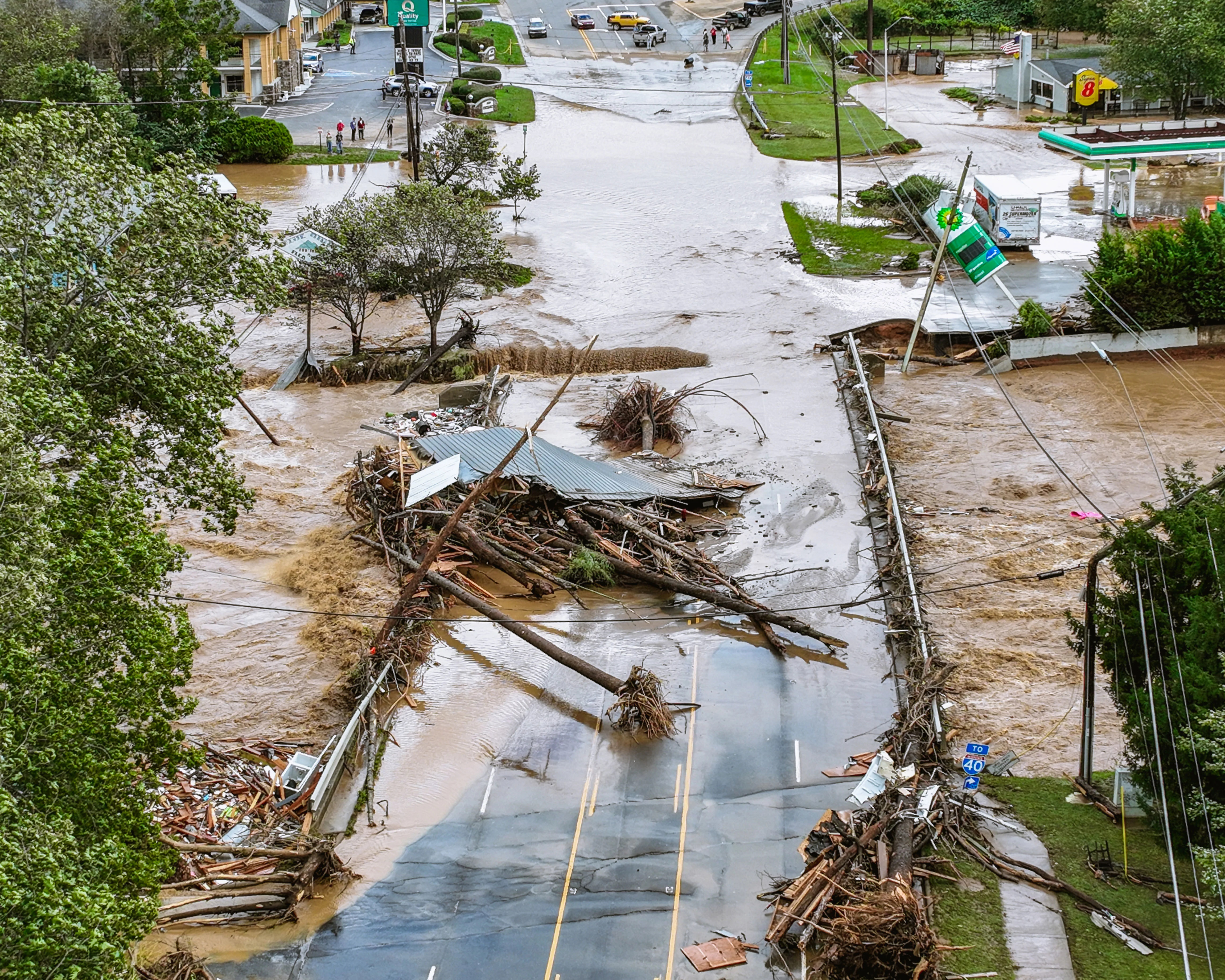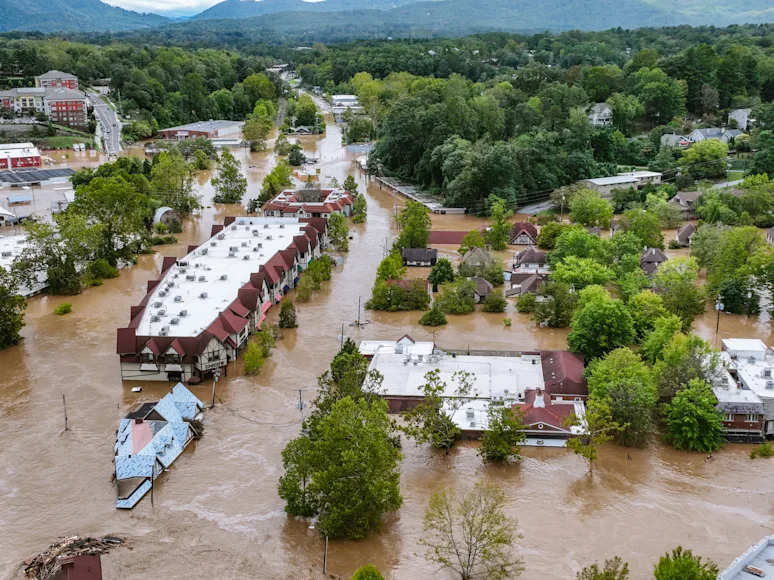People across the Southeast are reeling after high winds and torrential rains from Hurricane Helene caused unprecedented destruction and deadly flooding. Some of the hardest-hit areas were in the western North Carolina mountains, which had already received heavy rainfall before the hurricane arrived. Pictures and videos coming out of the area are sobering. Major dams spilled over during the storm, inundating communities downstream. Countless roads, including a portion of I-40 along the North Carolina-Tennessee border, were washed away completely, leaving people stranded without power, cell service, food, or water.
In the aftermath, people who made it through the floods safely are coming together to help those still in need. Among them are local fly shops and fishing guides. We spoke to a handful of shop owners, managers, and guides in the area to see how they’re coping with the devastation, how long they think it’ll take to bounce back, and what people outside the region can do to help during these trying times.

Jessica Whitmire, Headwaters Outfitters
Jessica Whitmire owns Headwaters Outfitters in the small Appalachian community of Rosman, North Carolina, near the South Carolina border. Her family’s campground, fly shop, and adjacent tap room were all flooded, but she says she fared better than others in more heavily impacted areas downstream.
“From northern Georgia, upstate South Carolina, all throughout western North Carolina, and into eastern Tennessee, it’s just a path of destruction for our fly fishing community,” says Whitmire. “It’s going to take years for some of these communities to get back up on their feet.”

Whitmire’s shop stands on stilts at the headwaters of the French Broad. After weathering flooding from Tropical Storm Fred in 2021, she was anticipating high waters when Helene hit last week, but she never expected to lose power, water, and cell phone service for days on end. “We’re in a small Appalachian community, so communication and family are very important,” she says. “As soon as we lost that connection to one another, that’s when it got scary.”
Whitmire says her staff is all safe and accounted for. For the time being, she has suspended all business operations at Headwaters. All available resources and manpower are being steered toward community members in need.
“I know there are counties, like Yancy and Buncombe, that are still cleaning up bodies. Asheville apparently has run out of body bags,” Whitmire says. “All of our guides left out about 7 a.m. this morning to help another shop in Burnsville that we’re friends with. They were hit much harder.”
Whitmire is pointing people who want to help to a GoFundMe page set up by Southern Culture on the Fly, a fly fishing magazine based in the area.
Tanner Schmidt, 828 Flies and Outfitters
Tucked away in the mountains of western North Carolina, 828 Flies was in the direct path of Hurricane Helene. A sister shop to 239 Flies in Bonita Beach, Florida, 828 opened its doors in 2022. Other than a tree falling on the shop, it made it through the storm fairly unscathed. But the same can’t be said for many of its neighbors.
“Right now, we're using our shop as a shelter for those who can't make it into town,” 828 general manager Tanner Schmidt tells Field & Stream. “We have sleeping bags set up on the floor and drinking water available. We are working on getting a Starlink up so people can contact their loved ones.”
Schmidt, who lives in the upstairs portion of the shop with some of the guides, stuck out the storm as it made its way through the area. The group lost power and was cut off for nearly 48 hours. “A creek flooded and carved a six by eight-foot channel near the driveway where we couldn't even get our trucks across into the road,” says Schmidt. The area around the shop is still in very bad condition.

Seven Devils, where the shop is located, saw over 36 inches of rain in two days. The weather station told Schmidt that their shop was right in the heart of where the storm hit. “We watched our neighbor's entire store float right past us from inside the shop,” says Schmidt. “Me, two of our guides, and our neighbor went out and pulled people out of buildings, saved people off of cars, and made dams to redirect streams so emergency vehicles could get through.”
Like many other Carolinians, Schmidt and his team weren’t expecting a storm of this magnitude. “People in our area were never told to evacuate. We were expecting a rainstorm, not this.”
Right now, 828 Flies is focused on getting people to shelter and safety. Then, they are faced with the tall task of rebuilding homes, clearing debris, and restoring their community to livable conditions. The shop has relief T-shirts and stickers available for sale on the 828 and 239 websites. All the profits will go towards local guides and community recovery. As far as donations, Schmidt says that the Red Cross and Cajun Navy are great places to send money.

Kevin Howell, Davidson River Outfitters
Kevin Howell owns Davidson River Outfitters in Brevard, North Carolina, which sits at the gates of the Pisgah National Forest along the Davidson River. He says his shop was spared the type of heavy destruction that other fly shops and outfitters are facing further downstream. “The water got to within six inches of our door before it started receding,” Howell tells F&S. “Places further downstream got destroyed.”
According to Howell, Transylvania County had just received up to 10 inches of rain when Helene showed up and dropped an additional 17 inches. The French Broad River, which runs through Asheville, crested out at 29 feet, breaking a flood record that dates back to 1916.

“We don’t know what a lot of the smaller rivers got up to because it blew the gauges out,” he says. “The USGS gauges are all destroyed. The Davidson went offline at 10,000 CFS”
Like Whitmire, Howell and his crew are doing everything they can to help their neighbors. “We have several communities of 50 to 60 people where a bridge got taken out and now they’re just stuck with nothing,” he says. “We’ve partnered up with the Cajun Navy Relief out of Louisiana. Yesterday, we took 15 truckloads to communities that were cut off. We took the supplies out as far as we could in the trucks, then walked it across planks or whatever we had to do to get it to those people. We’ll be back out there this afternoon and then first thing tomorrow morning.”
Howell says teams of horses and pack mules are distributing supplies to isolated areas as well. While helicopters are distributing aid wherever possible, much of the area is so heavily forested that the choppers can’t find safe places to land.
“If there’s anyone local who wants to drop off supplies at our shop, we will get it to the people in need,” Howell says. “Beyond that, we're directing people to the Cajun Navy if they want to make donations.”
Miller Watson, Hunter Banks Fly Fishing
Hunter Banks Fly Fishing is one of the premier fly shops in Asheville, North Carolina. Miller Watson, co-owner and Chief of Operations, stuck out the storm in his hometown of Maggie Valley, 35 minutes west of Asheville. Some of the worst damage took place between the two areas.
“Communities like Swannanoa, Old Fort, Black Mountain, Bat Cave, Chimney Rock were hit the hardest,” says Watson. “I have a lot of friends through our guide community that live in those areas, and what they're going through is devastating.”

Just like 828 flies, Watson wasn’t expecting the storm to be this bad. “I think all of us were prepared for flooding and something of that nature, but no one expected it to be as widespread as it was with a large number of fatalities.”
Luckily, his fly shop only experienced minor flooding in the basement, but they know of other shops and tackle stores that weren’t as fortunate. Right now, Watson and his team are working with Beloved Asheville, an organization offering supply and donation drop-off and pickup. “From there, we're either distributing [supplies] through customers or our guides,” explains Watson. “Or we're having folks swing directly through the fly shop and pick it up.”
According to Watson, the Pigeon River hit 53,000 CFS. To put that in perspective, this stream normally sees flows around 500 to 2000 CFS this time of year. The negative environmental impacts on local fisheries and the Appalachian Trail have yet to be seen.
Watson says that the best places for people to donate include Beloved Asheville and other larger organizations like Miller FEMA, Red Cross, United Way, Samaritan's Purse, and Salvation Army.



